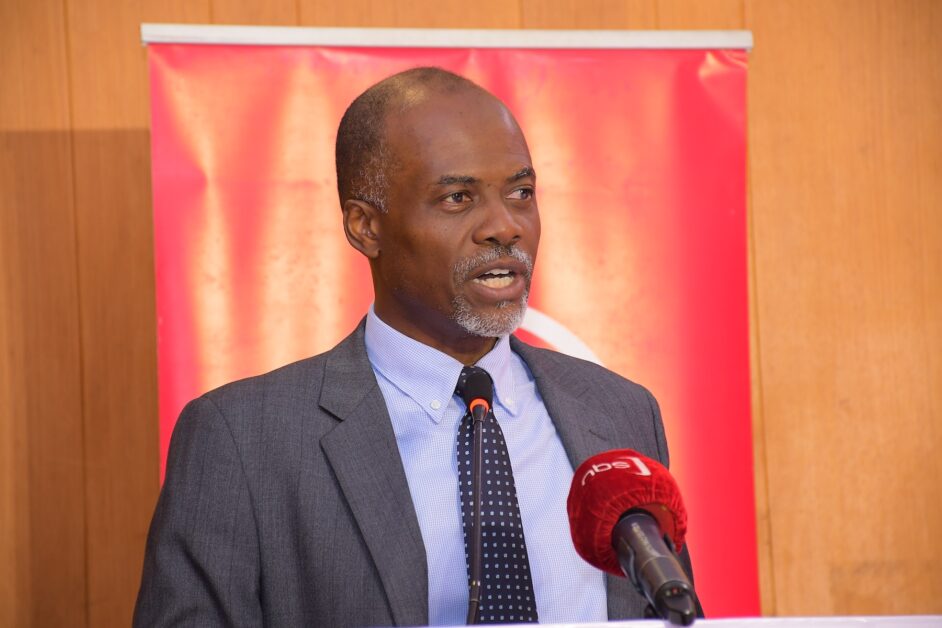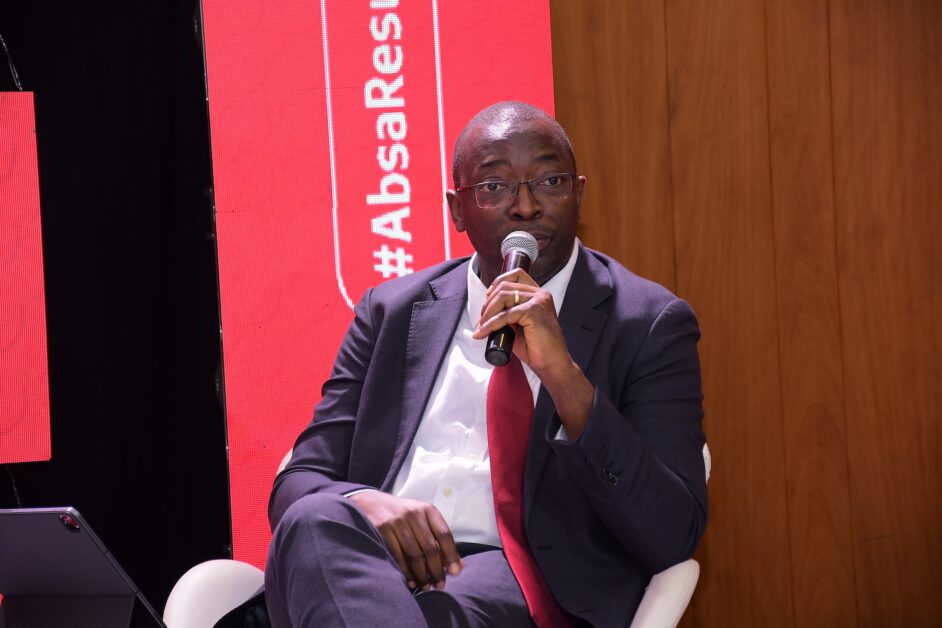Absa Bank Uganda has announced robust financial performance for the year ended December 31, 2024, registering a 22% increase in net profit to UGX 178 billion, up from UGX 145.76 billion in 2023.
The growth was driven by double-digit improvements across key financial fundamentals, including revenue, customer deposits, loans, and asset base, underpinned by disciplined execution, a supportive macroeconomic environment, and ongoing digital and operational transformation, the bank said.
According to interim Managing Director David Wandera, the performance underscores the bank’s ability to execute effectively in a complex environment.
“2024 was a transformative year for Absa Bank Uganda, marked by a 22% increase in profit after tax, expanded product offerings, and a strengthened market position, reinforcing our status as one of Uganda’s leading banks,” said Wandera, adding: “Our strong results reflect the resilience of our business model and the success of our strategy in responding to evolving market needs. We supported customers across all segments, from SMEs to large corporates with timely and relevant financial solutions”.
Revenue Growth Driven by Diversified Income Streams
Absa Bank Uganda posted a strong top-line performance in 2024, with total income rising by 15.1% to UGX 546 billion, up from UGX 475 billion in 2023. This growth is well above the bank’s 14.4% four-year compound annual growth rate (CAGR) for total income.
The growth was underpinned by a balanced contribution from both funded and non-funded revenue streams, reflecting the bank’s strategic emphasis on diversification and innovation.
Net interest income increased to UGX 311 billion, from UGX 280 billion in 2023, driven by expanded lending, improved pricing, and a high-interest rate environment that boosted returns on treasury assets. Meanwhile, non-funded income rose sharply to UGX 235 billion, compared to UGX 195 billion the previous year—representing a 21% increase.
The surge in non-interest income was further supported by product innovation and a deepening of transactional activity. “The strong NFI growth was supported by high demand for risk management products, a 26% YoY increase in off-balance sheet instruments, and a 38% rise in credit card billables,” the bank noted.
“Non-funded income is the revenue we have from the fees and commissions. It’s also a reflection of the fact that customers are trusting us to do more transactions, and we’ve seen that grow by 21%, which is a clear reflection of that trust,” noted Chief Financial Officer Michael Segwaya.,
“The bank’s strong revenue performance is a testament to our sound financial strategy and disciplined execution.”

Interim Managing Director David Wandera echoed this view, attributing the outcome to a clear strategic direction and operational focus: “Our 2024 performance reflects our commitment to sustainable value creation. We achieved a 15.1% increase in total revenue and a 12.7% rise in net customer loans, driven by growth in key sectors like trade, agriculture, and manufacturing. These results reflect disciplined execution, sector-focused lending, and the embedment of our refreshed, human-centred brand promise – Your Story Matters.”
In terms of sector distribution, retail banking contributed 32.5% of the bank’s total revenue, followed by corporate banking at 25.3%, markets at 17.5%, business banking at 15.7%, and treasury activities at 9.1%. This broad-based revenue mix underlined Absa’s strength as a diversified franchise with multiple growth engines.
Growth in Purposeful Lending Powered by Deposit Growth
Powering interest income growth was the bank’s continued expansion of its lending activities in line with strategic national priorities and customer needs, with a focus on real economy sectors. Net loans and advances to customers increased by 12.7% to UGX 1.994 trillion, up from UGX 1.769 trillion in 2023.
Wandera said this growth was driven by “robust uptake of trade loans, asset finance, mortgages, and credit cards”. Trade Loans grew (+48%), Asset Finance (+66%), Mortgages (+23%), and Credit Cards (+38%).”
“This growth underscores our confidence in Uganda’s private sector and our role as a key enabler for business expansion and household empowerment,” he told told stakeholders, at Kampala Serena Hotel, adding: “We tailored financial solutions to meet our personal and business needs, and we extended credit to fuel growth and economic recovery in the key sectors of the economy.”
“We maintained strong lending momentum despite a challenging economic environment… reflecting our commitment to supporting commerce and private sector growth,” he said, adding: “We continue to support agri-businesses, value chains, and industrial players through tailored financing, and we’re exploring new opportunities to expand lending in these areas.”
Absa’s loan book reflected strong sectoral distribution, with 30% of lending going to trade (UGX 1.048 trillion), 17% to agriculture (UGX 594 billion), 12.2% to manufacturing (UGX 428 billion), and 10.6% to personal lending (UGX 371 billion).
“Our lending strategy reflects our commitment to catalysing Uganda’s real economy. The sustained growth in our loan book is not only a result of customer confidence, but also our prudent risk management and sectoral focus,” said Michael Segwaya.
To fund this expansion, customer deposits increased by 11.5% to UGX 3.185 trillion, up from UGX 2.856 trillion in 2023. Local currency deposits rose to UGX 1.989 trillion, while foreign currency deposits increased sharply to UGX 1.196 trillion, up from UGX 904 billion the previous year.
“This growth in deposits is a clear signal of our customers’ trust in Absa,” said Segwaya. “It strengthens our ability to extend more credit and expand access to underserved market segments.”
Deposit growth was driven by new-to-bank customer acquisitions, reactivation of dormant accounts, and enhanced customer engagement through alternate and digital channels. These efforts helped the bank mobilise sustainable funding to support inclusive lending and credit access across Uganda.
Strengthened Balance Sheet and Improved Asset Quality
Total assets grew by 19.1% to UGX 5.432 trillion in 2024, up from UGX 4.561 trillion the previous year. This growth was “attributed to pipeline conversion in strategic sectors: Agriculture, Trade, Manufacturing, and Personal Loans.”
Shareholders’ equity increased to UGX 859 billion, compared to UGX 814 billion in 2023, driven by improved profitability and retained earnings. Over a four-year period, equity has grown at a CAGR of 10.6%, reinforcing the bank’s capacity to fund expansion and meet regulatory expectations.
“With a stabilising macroeconomic environment and a strong risk governance framework, Absa Bank Uganda is well-positioned to sustain momentum and deliver value for all stakeholders,” said Michael Segwaya, Executive Director and Chief Financial Officer.
Absa also reported continued improvement in its capital adequacy position. The total capital ratio rose to 22.72%, from 22.63% in 2023, and remained well above the regulatory minimum of 15%. Core capital improved to 20.48%, up from 20.24%, while the liquidity ratio strengthened to 46.0%, from 44.13%—more than double the 20% regulatory threshold.

On asset quality, the bank reported further gains. Impairment provisions rose modestly to UGX 4.644 billion, from UGX 2.378 billion in 2023, but were “in line with balance sheet growth netted off by improved credit monitoring strategies and growth in recoveries.” The credit loss ratio improved to 0.27% from 0.41% in the previous year, demonstrating effective credit risk controls.
“Our strong capital base and improved credit metrics provide a solid foundation for growth,” Segwaya emphasised.
The bank’s return on assets also improved to 3.56%, up from 3.31% in 2023, while the loan-to-deposit ratio remained healthy at 62.6%. These ratios collectively signalled prudent balance sheet expansion, capital resilience, and asset efficiency.
Efficient Cost Management Supports Profitability
While delivering strong revenue growth in 2024, Absa Bank Uganda maintained a disciplined approach to cost management, resulting in improved operational efficiency and a stronger bottom line. Total operating expenses grew by 8.2% to UGX 308.1 billion, up from UGX 284.7 billion in 2023. The increase was attributed to “additional software licenses acquired, property repairs coupled with double plan IT costs and revised insurance premiums.”
Despite this increase, the bank’s cost-to-income ratio improved significantly to 56.4%, compared to 60% in 2023. Over a five-year horizon, Absa’s cost-to-income ratio has trended downward—from 67.4% in 2019 to 56.4% in 2024—highlighting gains from digital investments, process automation, and performance-based culture.
“We continue to make strategic investments in our people and technology while maintaining a keen focus on cost control,” said Michael Segwaya, Executive Director and Chief Financial Officer.
Operating expense breakdowns revealed that staff costs rose from UGX 135.2 billion to UGX 151.7 billion, depreciation and amortisation grew from UGX 17.96 billion to UGX 19.02 billion, and other operating expenses increased slightly to UGX 137.4 billion.
The steady rise in expenses was outpaced by even stronger growth in total income, supporting a 22% increase in profit after tax, up to UGX 177.87 billion from UGX 145.76 billion in 2023.

The bank also demonstrated improved tax compliance and contributions to national revenue, with its effective tax rate increasing from 22.3% to 23.8%.
Return on equity climbed to 21.9% (2023: 20.9%) while return on assets improved to 3.56% (2023: 3.31%), reflecting stronger profit margins and efficient balance sheet utilisation.
Together, these gains underscored Absa Uganda’s ability to sustain profitability while investing in long-term transformation.
Outlook for 2025: A Strategy for Shared Value and Inclusive Growth
Absa Bank Uganda enters 2025 with strong momentum, underpinned by its performance in 2024 and a firm commitment to inclusive, purpose-led growth. The bank has outlined a bold medium-term strategy anchored in five interconnected pillars: building a diversified franchise with deliberate, market-leading growth; becoming the primary partner for its clients; operating as a digitally-powered business; nurturing a winning, talented, and diverse team; and remaining an active force for good in everything it does.
“Looking ahead, we are well-positioned for sustained growth and remain committed to our ambition to be a purpose-led bank, Empowering Africa’s tomorrow together, one story at a time,” said David Wandera, Interim Managing Director.
The bank’s focus will remain on investing in digital transformation, talent development, and ESG-led initiatives that align with the needs of its customers and communities.
“We will continue investing in digital capabilities, talent development, and ESG-driven initiatives to deliver solutions that matter to our customers and communities,” Wandera affirmed.
Absa’s leadership has emphasized that financial success must go hand in hand with societal impact. As such, the bank will continue channelling capital into sectors that stimulate national development and widen access to finance.
“We remain dedicated to Uganda’s development, leveraging our strong capital position to support key sectors that drive economic growth. We take pride in empowering businesses, enabling opportunities, and contributing meaningfully to national progress,” Wandera noted.
This purpose-driven approach is a core part of the bank’s ethos, as Wandera summed up: “Together, we will keep shaping Uganda’s success story — because, at Absa, Your Story Matters.”


 CEOs in the Hot Seat: Juliana Kagwa and the High-Stakes Rebuild of Uganda’s Tourism Brand
CEOs in the Hot Seat: Juliana Kagwa and the High-Stakes Rebuild of Uganda’s Tourism Brand



